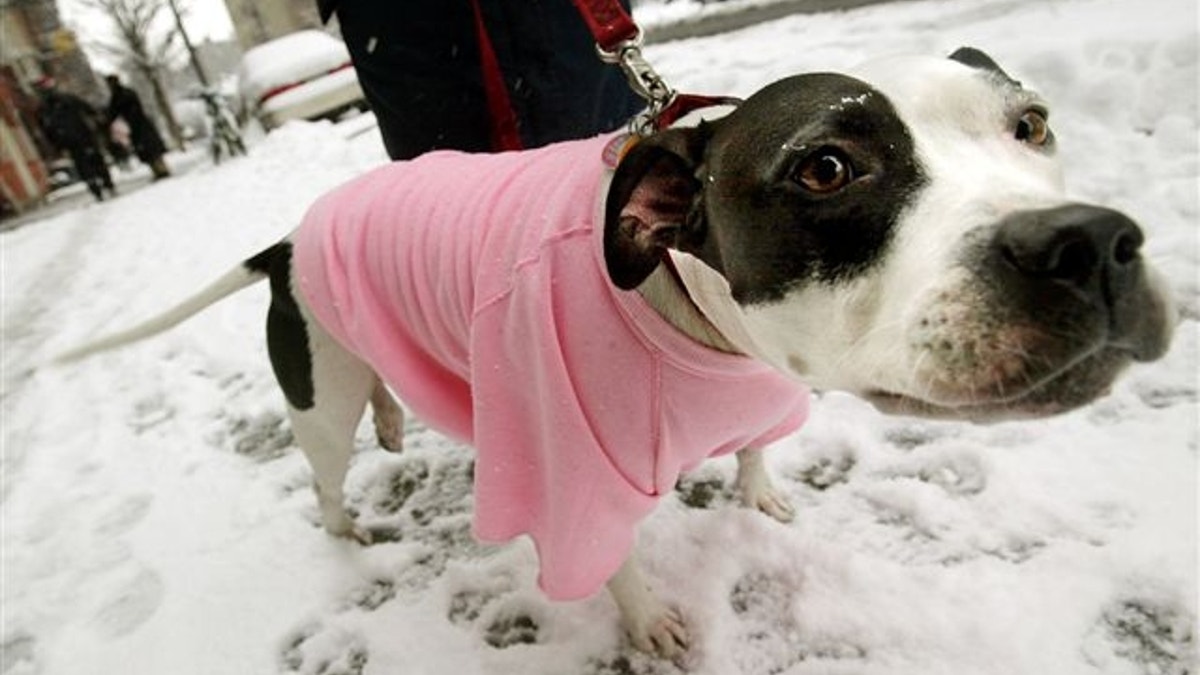
(Getty)
Just because your dog has fur doesn’t mean that he is naturally protected from the cold. In fact, most pets don’t undergo major physiological changes that would prepare them for fall and winter.
Only a few breeds, such as the Siberian Huskies, the Saint Bernards and the Bernese Mountain Dogs, have physical characteristics that make them more resistant to cold.
In fact, the cool weather makes these breeds enjoy and reach strength in their normal activities as they have a thicker layer of fat under their skin and a denser undercoat so they really don’t feel much cold during those long winter nights.
Puppies and kittens up to two months of age do not yet have an efficient capacity to maintain body temperature and they lose heat easily. In the cold, the need for energy increases and the animals that do not receive adequate food and heat could possibly die.
Keeping the litter in a protected location, confined in a small room with regulated temperature and cloth lining underneath the bed is a simple attitude to preserve the heat.
How can a dog die of cold?
The normal dog’s body temperature (101.5 degrees) is regulated by a small organ in the brain called hypothalamus - it makes them pant when the body needs to cool down and shiver when they need to preserve body heat. If the external cold is too intense, the first area to be affected is precisely the hypothalamus, which loses the ability to adjust the temperature.
As all chemical reactions in the body need heat, very cold temperatures will induce a gradual decrease in the vital functions and the body undergoes a state of hypothermia - which means lack of heat for the body to work. Simply put: the heart, which needs energy, and therefore heat, to beat, begins to slow down. The same happens with the breathing cycle, which needs the contraction of muscles to work, and therefore, heat.
As the transmission of impulses from the central nervous system also needs heat, the animal begins to lose its sensitivity. Thus, he will lose consciousness until the heart stops. The time it takes for a dog to die of cold varies accordingly to certain circumstances: if it is windy, for example, it is shorter, because the wind cools the body much quicker.
With cold temperatures on the way, now is the time to take steps to protect your four legged family member from the cold and wet weather. With a few simple precautions you can ensure your pets stay happy and healthy throughout the colder months of the year.
Which animals can bear the lowest temperatures?
The penguins of Antarctica, the coldest region on earth, and a frog that lives in the arctic circle divide the title. The penguins protect themselves from the cold thanks to a thick layer of fat and their plump bodies. The forest frog (Rana sylvatica) lives in the Arctic where the coldest record temperature has been reported to below 90 degrees Fahrenheit. This species of frog is able to spend weeks frozen, as if dead. When that happens, ice crystals involve its skin, the heart stops beating and breathing ceases. It won't die because the glucose present in its frozen blood preserves the vital organs. When the temperature rises, the forest frog, an amphibian of a maximum 8 cm long, will bounce "back to life" as if nothing happened!
Paco the Crime Fighting Chihuahua
How to Protect Your Pet?
The best way to protect your pets during the winter? Bring them inside! Pets are safer indoors. If you can't have your pet inside the house then get an insulated dog house or build a protective enclosure that shields your pet from the elements and gives them a safe, warm place to stay.
Certain pets are more vulnerable to low temperatures than others. Short-haired dogs, the very young or the old dogs and all cats should not be left outside during winter time. Short-haired dogs benefit from a warm sweaters while outside.
Another important aspect to consider is extra food for those pets who spend much of their day outdoors during the winter months. That’s because they use up more energy trying to stay warm.
If you’re planning on bringing your pets into the garage on cold nights make sure you store all chemicals out of reach, one in particular is the antifreeze which has a sweet taste that attracts dogs in particular and is a deadly poison.
And regardless of the season always provide fresh and clean water.
Dr. Krieger is a practicing veterinarian in Washington Heights Animal Hospital in New York City. She hosts a weekly TV segment on pet health and animal science at Television Dominicana. Her website is: www.EduardaKrieger.com
Follow us on twitter.com/foxnewslatino
Like us at facebook.com/foxnewslatino




















